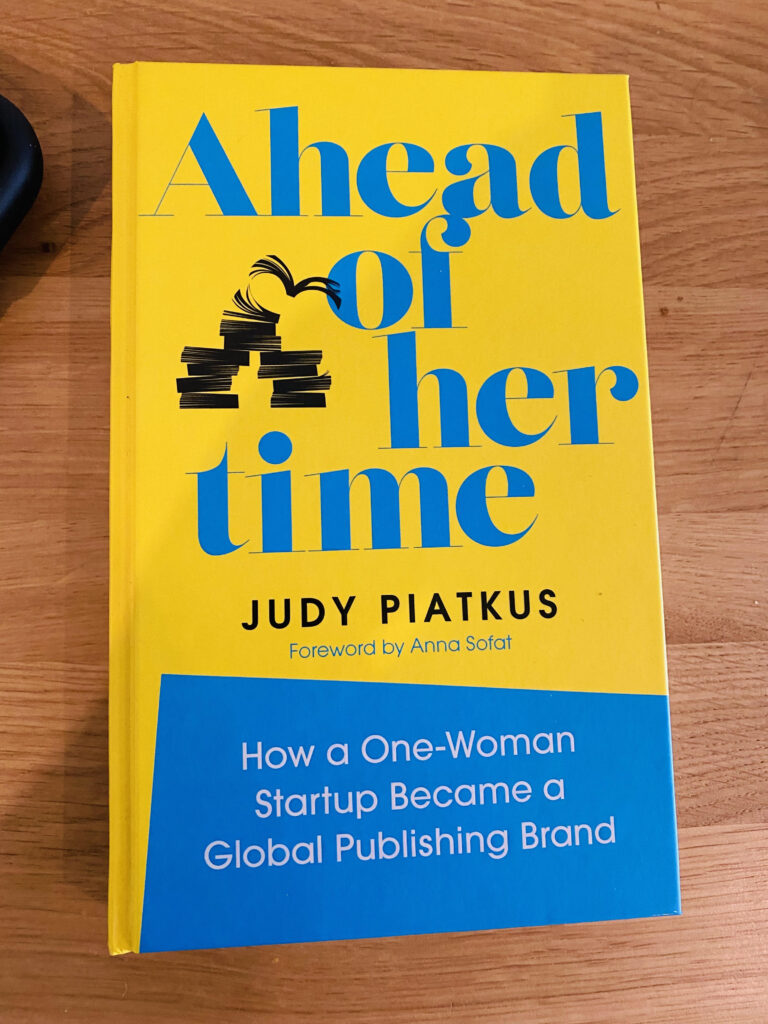It is hard to think about now but female entrepreneurs used to be thin on the ground. Sure we are lucky to have Jo Malone, Anya Hindmarch, Natalie Massenet, Kelly Hoppen and Karen Brady, but before all of them came Judy Piatkus. A single mother-of-three who built a publishing empire with one hand behind her back. Well, almost.
Now Judy has written a book Ahead of Her Time; How a One-Woman Startup Became a Global Publishing Brand and it is the new bible to help other entrepreneurs and people who are interested in business. The book gives a fascinating insight for those who are interested in publishing. Judy did all of this while while taking care of her three children, one of whom is disabled.
I found this book so inspiring that it has made me drag out an old business plan I had and start work on a logo for that, and a new one for Frost. Piatkus books was built at a time when women were discriminated against. We still are, but it has got better.
I implore anyone who is interested in building a business, publishing, or even just loves a story about how someone built something amazing, despite the odds against them, to read this book. It really is brilliant. I will be handing copies out to my female friends. Judy Piatkus truly was ahead of her time.
Ahead of Her Time; How a One-Woman Startup Became a Global Publishing Brand by Judy Piatkus is an incredibly inspiring book.
Judy Piatkus did not come from a monied background and began her career as a secretary after failing to achieve a university place. By the time she founded Piatkus Books from her spare bedroom, she was married with a disabled small daughter and pregnant with her second child. Gradually she learned how to be both a publisher and a managing director and to combine that with her family life as she had become a single mother of three. A lot of mistakes were made but she also got a lot of things right. The company prospered, thanks to the risks Judy took in tackling new subjects in the marketplace and also her approach to running the company, which focused on transparency, honesty and trust and was rewarded by the loyalty of the staff, many of whom worked alongside Judy for upwards of twenty years.
In 1979, Judy Piatkus founded what would become a global publishing brand— Piatkus Books — from her spare bedroom.
A single mother, with a child with learning disabilities, at a time when being a self-made woman entrepreneur was rare, Judy defied expectations, influencing, shaping, and giving rise to a new industry of personal growth and development publishing.
Long before the bestseller charts were packed with mind/body/spirit, business, and relationship books, Judy created a platform for new, as yet unknown, voices and leading authorities and experts in their fields, including Jon Kabat-Zinn, Mary Berry, David Allen and Brian L. Weiss.
‘Ahead of her time’ goes behind-the-scenes and reveals the inner workings of book publishing. Judy details how her combination of financial risk taking, transparent approach in business, and courage to tackle new subjects in the marketplace rather than follow trends, led PiatkusBooks to become a leading global independent publisher.
Judy’s memoir is also a fascinating insight into building a company and brand identity and what enables a team and a business to succeed.
Judy details her learning experience as an entrepreneur — the triumphs and the pitfalls, what worked and what didn’t, how to reinvent through lean times, learning to be both a publisher and a managing director, and how it felt to overcame obstacles in order to build the career she wanted from the ground up, as a truly self-made woman.
‘Ahead of her time’ is published by Watkins Publishing, £14.99, and is available here and from all good bookstores.








